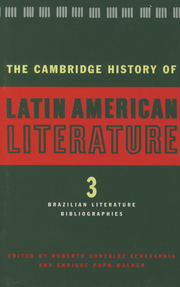Book contents
- Frontmatter
- Introduction to Volume 3
- 1 The literary historiography of Brazil
- 2 Colonial Brazilian literature
- 3 Brazilian poetry from the 1830s to the 1880s
- 4 Brazilian poetry from 1878 to 1902
- 5 The Brazilian theatre up to 1900
- 6 Brazilian fiction from 1800 to 1855
- 7 The Brazilian novel from 1850 to 1900
- 8 Brazilian fiction from 1900 to 1945
- 9 Brazilian prose from 1940 to 1980
- 10 The Brazilian short story
- 11 Brazilian poetry from 1900 to 1922
- 12 Brazilian poetry from Modernism to the 1990s
- 13 The Brazilian theatre in the twentieth century
- 14 Brazilian popular literature (the literatura de cordel)
- 15 Literary criticism in Brazil
- 16 The essay: architects of Brazilian national identity
- 17 The Brazilian and the Spanish American literary traditions: a contrastive view
- Bibliography
- Index
- References
11 - Brazilian poetry from 1900 to 1922
Published online by Cambridge University Press: 28 March 2008
- Frontmatter
- Introduction to Volume 3
- 1 The literary historiography of Brazil
- 2 Colonial Brazilian literature
- 3 Brazilian poetry from the 1830s to the 1880s
- 4 Brazilian poetry from 1878 to 1902
- 5 The Brazilian theatre up to 1900
- 6 Brazilian fiction from 1800 to 1855
- 7 The Brazilian novel from 1850 to 1900
- 8 Brazilian fiction from 1900 to 1945
- 9 Brazilian prose from 1940 to 1980
- 10 The Brazilian short story
- 11 Brazilian poetry from 1900 to 1922
- 12 Brazilian poetry from Modernism to the 1990s
- 13 The Brazilian theatre in the twentieth century
- 14 Brazilian popular literature (the literatura de cordel)
- 15 Literary criticism in Brazil
- 16 The essay: architects of Brazilian national identity
- 17 The Brazilian and the Spanish American literary traditions: a contrastive view
- Bibliography
- Index
- References
Summary
Positioned between the rise of Parnassianism and Symbolism in the last two decades of the nineteenth century and the drastic innovations of Modernism in 1922, the period from 1900 to 1922 brought no dramatic changes of direction to Brazilian poetry. This period, which many literary historians agree to label “pre-Modernism,” yielded more remarkable prose narratives – by Lima Barreto (1881–1922), Graca Aranha (1868–1931), Euclides da Cunha (1866–1909) – than poetry.
An absence of sustained quality in the works of poets who began writing in that period did not mean an absence of poetry. Much verse was in fact produced, read, and recited. Parnassianism (usually dated from 1882 with the publication of Fanfarras by Teófilo Dias (1857–1889)) and Symbolism (dated from 1893 with Broquéis and Missal by Cruz e Sousa (1861–1898)) continued into the new century. Major figures of established reputation were still alive and writing, such as the Parnassians Olavo Bilac (1865–1918), Raimundo Correia (1859–1911), Alberto de Oliveira (1857–1937), Vicente de Carvalho (1866–1924), and Francisca Julia (1874–1920), and the Symbolist Alphonsus de Guimaraens (1870–1921). The younger poets starting out in those styles – the so-called neo-Parnassians and neo-Symbolists – did so as contemporaries of their masters, sometimes under their auspices. Symbolism never set down roots as firmly as Parnassianism, and the reign of the latter was tenacious. Otto Maria Carpeaux reminds us that in Brazil the sequence of movements did not follow the European one, where Symbolism supplanted the earlier Parnassianism: “the two great poets of Brazilian Symbolism, Cruz e Sousa and Alphonsus, did not manage to prevail, succumbing to a hostile environment. Parnassianism, outliving itself, continued; and when it was in turn defeated, the victory belonged to Modernism . . .”
- Type
- Chapter
- Information
- The Cambridge History of Latin American Literature , pp. 233 - 246Publisher: Cambridge University PressPrint publication year: 1996



